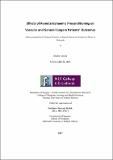| dc.contributor.author | Ahmed, Khalid | |
| dc.date.accessioned | 2019-11-07T08:56:21Z | |
| dc.date.issued | 2017-09-29 | |
| dc.identifier.uri | http://hdl.handle.net/10379/15550 | |
| dc.description.abstract | Remote ischaemic preconditioning (RIPC) has been suggested as a non-invasive treatment option in many recent studies. The focus of this thesis is to evaluate the possible effect of this on major health problems in vascular and general surgery patients.
Contrast-induced acute kidney injury is the third leading cause of intra-hospital acute kidney disease, accounting for 11% of all cases; the protective role of RIPC has been highlighted in recent reviews. The author has utilised Bayesian statistics and the Markov chain Monte Carlo method to compare direct and indirect evidence, and has conducted a comprehensive systematic review and network meta-analysis for randomised controlled trials that have examined preventive methods. The network compared RIPC against 43 other interventions. In total, 42,273 patients and 44 interventions in 197 trials were included.
Intermittent claudication is a common presentation with no discernible benefit from surgical options in the early and moderate stages. Animal data suggest that remote ischaemic conditioning can improve blood flow in ischaemic limbs and, consequently, may benefit claudication patients. The author has undertaken a randomised clinical trial to evaluate RIPC against structured exercise (SE). We randomised forty patients into four groups: RIPC alone, SE alone and RIC plus SE groups. The primary outcome was pain-free walking distance.
To establish a baseline for future evaluation of the RIPC cardioprotective effect on gastro-intestinal surgery patients, the author has conducted a prospective observational multicentre cohort study in four hospitals to determine the prevalence of myocardial injury. Preoperative demographic data, co-morbidities, blood sample including troponin T high sensitivity and ECG were recorded. Postoperative serum troponin levels were measured daily for the first 72 hours plus 12-lead electrocardiogram performed at 48 hours post-surgery. | en_IE |
| dc.publisher | NUI Galway | |
| dc.rights | Attribution-NonCommercial-NoDerivs 3.0 Ireland | |
| dc.rights.uri | https://creativecommons.org/licenses/by-nc-nd/3.0/ie/ | |
| dc.subject | Ischaemic Preconditioning | en_IE |
| dc.subject | Intermittent Claudication | en_IE |
| dc.subject | Myocardial Injury | en_IE |
| dc.subject | Contrast-induced Acute Kidney Injury | en_IE |
| dc.subject | Contrast-induced Nephropathy | en_IE |
| dc.subject | Network Meta-Analysis | en_IE |
| dc.subject | Surgery | en_IE |
| dc.subject | Medicine | en_IE |
| dc.title | Effects of remote ischaemic preconditioning on vascular and general surgery patients’ outcomes | en_IE |
| dc.type | Thesis | en |
| dc.local.note | Ischaemic Conditioning (RIC) is a natural phenomenon in human boday. it happened when we deprived limb or tissue of oxygen for a short time, not enough to cause damage; the cells react by releasing mediators in addition to sending signals via nerves which affect other body parts far from stress area
Previous studies suggest a protective role for RIC, we examine the effect of this phenomena on vascular patients with leg pain when walking to improve their symptoms and protection against kidney damage. We also obtained baseline information to help future research on the possible heart-protective effect for patients going for surgery | en_IE |
| dc.description.embargo | 2020-11-04 | |
| dc.local.final | Yes | en_IE |
| nui.item.downloads | 38 | |


